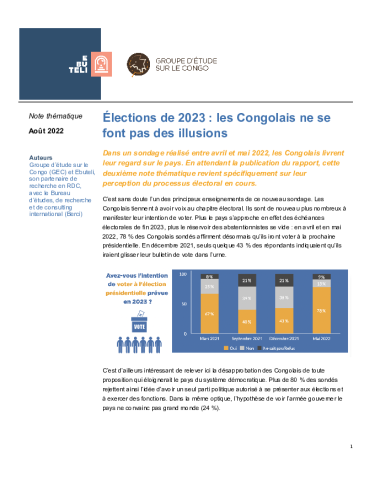Twenty months before the elections scheduled for the end of 2023 in the Democratic Republic of Congo (DRC), the pool of abstainers is empty.

The Congo Research Group and Ebuteli, its research partner in the DRC, along with the Bureau d’études, de recherche et de consulting international (BERCI) discuss Congolese sentiments on the upcoming 2023 elections in their latest analysis note, 2023 elections: The Congolese have no illusions based on a survey conducted between April and May 2022.
Key highlights from this analysis:
- 78 percent of the Congolese polled wished to vote in the next presidential election, whereas they were only 43 percent in December 2021.
- This survey also reveals mistrust of the Independent National Electoral Commission (CENI). More than 60 percent of the Congolese questioned affirm not to have the confidence or do not know if they have confidence in the CENI to organize credible, free, and transparent elections. This reluctance could be justified by a lack of transparency and consensus that characterized the process of appointing CENI leaders. Even Denis Kadima, the new president of CENI, is affected: only 28 percent of those polled have a good opinion of him.
- Another major lesson from the survey shows that the new electoral law goes against the grain of public opinion. Contrary to the option exercised by the parliamentarians, 68 percent of the respondents were in favor, for example, of the obligation to publish the results of the elections by each polling station. 54.5 percent of surveyed individuals considered it a “priority” for Parliament to remove the representativeness threshold to allow for small parties’ representation. Among deputies and senators, they have chosen to maintain it or even to add a new threshold of admissibility of the lists. Finally, this survey gives a glimpse of the importance regarding the game of alliances in progress for the future presidential elections. If President Félix Tshisekedi is certainly at the top of the voting intentions with nearly 31 percent—his score and that of his allies are slightly below the possible performance of his potential competitors combined.
Download the analysis (French-only):
Read the first analysis note in this series on the State of Seige: Congolese Increasingly Concerned by Security Situation


